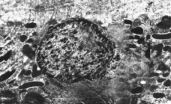(Press-News.org) INDIANAPOLIS -- How do parents decide whether to vaccinate their child? In a study designed to formally look at the content of parent-targeted communications about the benefits of vaccination for measles, mumps and rubella, Indiana University School of Medicine investigators report that the framing of these messages influences parents' intentions to immunize their children.
The investigators report that parents who viewed informational material highlighting direct benefits to their own child were the most likely to subsequently indicate that they would have their baby vaccinated for MMR, short for measles, mumps and rubella (German measles).
"Vaccine Message Framing and Parents' Intent to Immunize Their Infants for MMR" appears online in advance of publication in the September issue of the peer-reviewed journal Pediatrics, a publication of the American Academy of Pediatrics.
Led by social psychologist and pediatric health services researcher Kristin S. Hendrix, Ph.D., the study authors conducted a national online survey of 802 parents of infants younger than 12 months to determine their willingness to have their child vaccinated for MMR. The first MMR vaccine is recommended at 12 months. According to the Centers for Disease Control, the safety record of the MMR vaccine is very good. Measles is the most deadly of all childhood rash/fever illnesses and very easily transmitted, making it a significant public health threat, as evident in multiple outbreaks in recent months. Vaccination is by far the best tool for prevention.
"If we are going to increase childhood vaccine acceptance, we need to communicate more effectively about the benefits of vaccines, to help parents feel that they are making a more informed decision," said Dr. Hendrix, an assistant professor of pediatrics and a Regenstrief Institute and IU Center for Bioethics affiliated scientist.
The study tested various communications about the benefits of MMR vaccination. Each parent was given one of four messages and was instructed to keep his or her infant in mind when responding to the information:
1: Standard information statement from the Centers for Disease Control describing MMR and the MMR vaccine, including who should receive the vaccine, when they should receive it, contraindications, vaccine risks and what to do in the event of a serious reaction to the vaccine.
2: CDC information statement plus additional information highlighting the MMR vaccine's direct benefits to the child receiving the vaccine.
3: CDC information statement plus additional information highlighting the MMR vaccine's benefits to society at large.
4: CDC information statement plus additional information highlighting the MMR vaccine's direct benefits to the child receiving the vaccine as well as benefits to society at large.
Parents who saw text highlighting direct benefits to their own child (message 2) were significantly more likely to indicate that they would have their infant vaccinated than either parents who received language conveying only basic CDC information about MMR and the MMR vaccine (message 1) or those parents who received information stressing societal benefits (message 3). Combining details about societal benefits with information on benefits to one's own child (message 4) had the same impact on parents' vaccine intentions as information emphasizing the benefits only to the child (message 2).
"For parents in our study, mentioning the direct positive impact for their own child trumped mention of societal benefits," Dr. Hendrix said. "To me, this indicates that health care providers and public health officials should be explicit in mentioning the benefits of MMR vaccination directly to the child to help counter parents' over-inflation of risk of vaccination and related anxiety. However, we know community immunity is a critical societal benefit of vaccination, and perhaps there is a way to more compellingly communicate this to parents."
Parents who were planning to vaccinate their child as well as those who were hesitant to do so were surveyed for this study. A follow-up study is being developed to specifically target parents who say they are hesitant to vaccinate their child.
"We were surprised to find that pointing out that vaccinating their children could benefit others had no influence on parents' intention to vaccinate," said study senior author Stephen M. Downs, M.D., M.S. He is the Jean and Jerry Bepko Professor of Pediatrics, director of Children's Health Services Research at IU School of Medicine and a Regenstrief Institute investigator. "In studies of people considering vaccines for themselves, talking about benefit to society increased their intention to receive the vaccines. This didn't happen among parents."
INFORMATION:
This study was funded by a grant from the Indiana Clinical and Translational Sciences Institute. In addition to Drs. Hendrix and Downs, co-authors are S. Maria E. Finnell, M.D., M.S.; Gregory D. Zimet, Ph.D., and Lynne A. Sturm, Ph.D., of the Department of Pediatrics, and Kathleen A. Lane, M.S., of the Department of Biostatistics, all of the IU School of Medicine. Dr. Finnell is a Regenstrief Institute affiliated scientist.
IU study: Parents' vaccine intentions influenced by how benefits are communicated
2014-08-18
ELSE PRESS RELEASES FROM THIS DATE:
White, straight women leading surge in infertility treatments
2014-08-18
WASHINGTON — Heterosexual white women are twice as likely as racial or sexual minority women to obtain medical help to get pregnant, according to a recent study published by the American Psychological Association.
While income and lack of insurance only partially explained the lower number of racial minority women receiving fertility assistance, lack of insurance appeared to play a crucial role in whether lesbian and bisexual women received medical fertility help, especially in more recent years, according to the nationally representative study published in the APA journal ...
Environment and health experts commit to actions on climate change
2014-08-18
MONTREAL, August 15, 2014 — More than 500 delegates to the EcoHealth 2014 conference have issued a call to action to urgently and collaboratively address the impacts of climate change on the health of humans, animals and the global environment in light of the lack of a truly collective response to date.
Working through the International Association for Ecology and Health (IAEH), the 500 delegates from 62 countries, and the larger ecohealth community they reflect, have developed a vision and commitment to action that will bring together what is already being done to address ...
Stronger drunk driving laws lead to safer roads: Study
2014-08-18
Changes to British Columbia's laws against driving while impaired have reduced fatal crashes as well as ambulance calls and hospital admissions resulting from motor vehicle crashes, a new University of British Columbia study finds.
Researchers concluded that harsher penalties for impaired driving and speeding instituted by the B.C. government in September 2010 reduced crashes related to drinking and driving.
Automobile crashes declined 21 per cent, crash-related hospital admissions dropped 8 per cent and crash-related ambulance calls fell by 7.2 per cent. Based on ...
HSP72 confers protection in retinal ganglion cells and lateral geniculate nucleus neurons
2014-08-18
Optic nerve transection increased the expression of heat shock protein 72 (HSP72) in the lateral geniculate body, indicating that this protein is involved in the prevention of neuronal injury. Zinc sulfate and quercetin induced and inhibited the expression of HSP72, respectively. In a study reported by Dr. Ning Li and co-workers from the First Affiliated Hospital of Anhui Medical University, China, intraperitoneal injections of zinc sulfate, SP600125 (c-Jun N-terminal kinase inhibitor), or quercetin were performed on retinal ganglion cells in a Wistar rat model of chronic ...
Cholecystokinin octapeptide antagonizes apoptosis in retinal pigment epithelial cells
2014-08-18
Oxidative stress may cause retinal pigment epithelial (RPE) cell apoptosis. Nitric oxide and superoxide react to produce peroxynitrite, which, along with its derivatives, are strong oxidants. Cholecystokinin octapeptide-8 (CCK-8) can protect cholinergic neurons against basal forebrain lesion caused by brain injury. Research team at Hebei Province People's Hospital, China led by Dr. Yuan Liu treated human RPE cells with the oxidative stress inducer peroxynitrite, and evaluated the neuroprotective effects of CCK-8. Peroxynitrite triggered apoptosis in these cells, and increased ...
New discovery: Microbes create dripstones
2014-08-18
According to new research humble, microscopic organisms can create dripstones in caves. This illustrates how biological life can influence the formation of Earth's geology - and the same may be happening right now on other planets in space.
According to traditional textbooks dripstones are created by geological or geochemical processes with no influence from living organisms. But now scientists report that formation of dripstones can be a lot more complex than that: Sometimes microbes are responsible for the formation of these geological features.
The researchers from ...
Toothless 'dragon' pterosaurs dominated the Late Cretaceous skies
2014-08-18
A new study provides an exciting insight into the Late Cretaceous and the diversity and distribution of the toothless 'dragon' pterosaurs from the Azhdarchidae family. The research was published in the open access journal ZooKeys.
The Azhdarchidan pterosaurs derive their name from the Persian word for dragon - Aždarha. Interestingly, this derived and rather successful group of pterosaurs included some of the largest known flying animals of all times, with a wingspan reaching between 10 and 12 m.
'Dragon' pterosaurs had a worldwide distribution once and were the last ...
CU Denver study shows zoning regulations impact where marijuana dispensaries can locate
2014-08-18
DENVER (August 18, 2014) – Municipal zoning regulations may push marijuana dispensaries into low income, minority areas, according to a study just released by the University of Colorado Denver.
Published in the Journal of the American Planning Association, the leading professional and academic planning resource, the study shows that government regulations will likely cause an inequitable distribution of marijuana business throughout the city. Though the impact of dispensaries to the neighborhoods in which they are located has yet to be understood, the research is clear ...
Unraveling the mysteries of the Red Sea: A new reef coral species from Saudi Arabia
2014-08-18
The hard corals primarily responsible for the construction of coral reefs around the world have attracted the attention of taxonomists for hundreds of years. Despite the important role such corals play in building what are arguably the world's most diverse ecosystems, coral reefs in some parts of the world still hold surprises for modern scientists.
An international team of scientists has recently described a new hard coral species, Pachyseris inattesa, from the Saudi Arabian Red Sea. The study, led by the University of Milano-Biccocain collaboration with the King Abdullah ...
Artificial cells act like the real thing
2014-08-18
Imitation, they say, is the sincerest form of flattery, but mimicking the intricate networks and dynamic interactions that are inherent to living cells is difficult to achieve outside the cell. Now, as published in Science, Weizmann Institute scientists have created an artificial, network-like cell system that is capable of reproducing the dynamic behavior of protein synthesis. This achievement is not only likely to help gain a deeper understanding of basic biological processes, but it may, in the future, pave the way toward controlling the synthesis of both naturally-occurring ...




